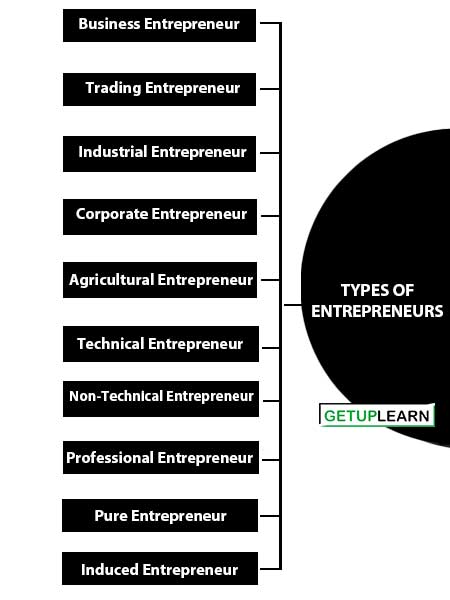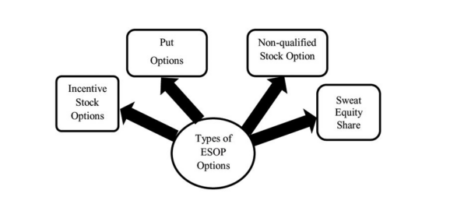Table of Contents
-
1 Types of Entrepreneurs
- 1.1 Business Entrepreneur
- 1.2 Trading Entrepreneur
- 1.3 Industrial Entrepreneur
- 1.4 Corporate Entrepreneur
- 1.5 Agricultural Entrepreneur
- 1.6 Technical Entrepreneur
- 1.7 Non-Technical Entrepreneur
- 1.8 Professional Entrepreneur
- 1.9 Pure Entrepreneur
- 1.10 Induced Entrepreneur
- 1.11 Motivated Entrepreneur
- 1.12 Spontaneous Entrepreneur
- 1.13 Growth Entrepreneur
- 1.14 Super-Growth Entrepreneur
- 1.15 First-Generation Entrepreneur
- 1.16 Modern Entrepreneur
- 1.17 Classical Entrepreneur
- 1.18 Innovating Entrepreneur
- 1.19 Fabian Entrepreneurs
- 1.20 Drone Entrepreneurs
- 1.21 Forced Entrepreneurs
- 2 FAQs Section
Types of Entrepreneurs
Schumpeter stated that entrepreneurs are adventurous innovators who act on their own will and introduce changes that others do not dare to experiment with. The types of entrepreneurs are classified in different ways by various authors.
The classification helps potential entrepreneurs to choose their own nature and style of entrepreneurship. The various types of entrepreneurs are as follows:
- Business Entrepreneur
- Trading Entrepreneur
- Industrial Entrepreneur
- Corporate Entrepreneur
- Agricultural Entrepreneur
- Technical Entrepreneur
- Non-Technical Entrepreneur
- Professional Entrepreneur
- Pure Entrepreneur
- Induced Entrepreneur
- Motivated Entrepreneur
- Spontaneous Entrepreneur
- Growth Entrepreneur
- Super-Growth Entrepreneur
- First-Generation Entrepreneur
- Modern Entrepreneur
- Classical Entrepreneur
- Innovating Entrepreneur
- Fabian Entrepreneurs
- Drone Entrepreneurs
- Forced Entrepreneurs

According to Type of Business
Entrepreneurs can be classified on the basis of the various types of business occupations and varying sizes of business. The broad classification is as follows:
- Business Entrepreneur
- Trading Entrepreneur
- Industrial Entrepreneur
- Corporate Entrepreneur
- Agricultural Entrepreneur
- Technical Entrepreneur
- Non-Technical Entrepreneur
- Professional Entrepreneur
Business Entrepreneur
Business entrepreneurs are individuals who imagine an idea for a new product or service and then set up a business to turn their idea into reality. They are the ones who strike both production and marketing resources in their search of developing a new business opportunity. Business entrepreneurs may set up a big establishment or a small business unit.
Trading Entrepreneur
Trading entrepreneurs are not concerned with the manufacturing of products. They are the ones who undertake trading activities. They identify potential markets, stimulate demands for their product line, and create a desire and interest among buyers to go in for their product. They are engaged in both domestic and overseas trade.
Industrial Entrepreneur
Industrial entrepreneurs meet the market needs by manufacturing products. They do this by identifying the potential needs of the customers and accordingly tailor the product or services.
They work with the possibility of giving shape to their ideas by creating and developing new products. They are product-oriented individuals and often start an industrial unit for the production of products.
Corporate Entrepreneur
Corporate entrepreneurs demonstrate their innovative skills in organizing and managing a corporate undertaking. A corporate undertaking implies a form of business organization that is registered under some law statute or Act, which provides it a separate legal entity.
Agricultural Entrepreneur
Agricultural entrepreneurs undertake agricultural activities such as sowing, raising, reaping, and marketing crops with the help of fertilizers and other inputs of agriculture.
Technical Entrepreneur
Technical entrepreneurs are essentially entrepreneurs of the “Craftsman type”. They develop a new and improved quality of goods because of their craftsmanship. They concentrate more on production than marketing.
They do not care much to generate sales by applying various sales promotional techniques. They demonstrate their innovative capabilities in matters of production of goods and rendering services.
Non-Technical Entrepreneur
Non-technical entrepreneurs are individuals who are not apprehensive about the technical aspects of the product in which they deal. Developing alternative marketing and distribution strategies to promote their business are their significant considerations.
Professional Entrepreneur
Professional entrepreneurs are individuals who are interested in setting up a business but do not have an interest in managing or operating it after its establishment.
According to Motivation
The force that influences the efforts of entrepreneurs to achieve their objectives is known as motivation. Entrepreneurs are motivated to achieve or prove their excellence in job performance. They are also motivated to influence others by demonstrating their power thus satisfying their eg:
- Pure Entrepreneur
- Induced Entrepreneur
- Motivated Entrepreneur
- Spontaneous Entrepreneur
- Growth Entrepreneur
- Super-Growth Entrepreneur
Pure Entrepreneur
Pure entrepreneurs are individuals who are motivated by psychological and economic rewards. To achieve personal satisfaction in work, status or ego is the main aim of undertaking entrepreneurial activities as a pure entrepreneur.
Induced Entrepreneur
Induced entrepreneurs refer to those individuals who are attracted to policy measures of the government and start-up entrepreneurial ventures. The assistance, incentives, concessions, and necessary overhead assistance by the government induce individuals to undertake entrepreneurial activities.
The force that influences the efforts of entrepreneurs to achieve their objectives is known as motivation. Entrepreneurs are motivated to achieve or prove their excellence in job performance. They are also motivated to influence others by demonstrating their power thus satisfying their ego.
Motivated Entrepreneur
New entrepreneurs are individuals who are motivated by the desire for self-fulfillment. They come into existence because of the likelihood of making and marketing some new products for the use of consumers. As the product is developed to a salable stage, the entrepreneurs are further motivated by rewards in terms of profit and enlarged customer networks.
Spontaneous Entrepreneur
Entrepreneurs who start their business out of their natural talent and instinct are called spontaneous entrepreneurs. They are individuals who are discoverers and initiators. Their boldness and confidence motivate them to undertake entrepreneurial activities.
Growth Entrepreneur
Growth entrepreneurs are individuals who essentially take up a high-growth industry. Such entrepreneurs choose an industry with substantial growth prospects.
Super-Growth Entrepreneur
Super-growth entrepreneurs are those individuals who make enormous efforts to take their venture to the enormous growth of performance. Their growth performance is identified by the liquidity of funds, profitability, and gearing of their venture.
According to Stages of Development
The types of entrepreneurs as per the stages of development include the following:
- First-Generation Entrepreneur
- Modern Entrepreneur
- Classical Entrepreneur
- Innovating Entrepreneur
- Fabian Entrepreneurs
- Drone Entrepreneurs
- Forced Entrepreneurs
First-Generation Entrepreneur
First-generation entrepreneurs are those who start an industrial unit by means of an innovative skill. They are essentially innovators, who combine different technologies to produce a marketable product or service.
Modern Entrepreneur
Modern entrepreneurs are those who undertake ventures that go well along with the changing demand in the market. They are interested in undertaking only those ventures that suit the current marketing needs.
Classical Entrepreneur
Classical entrepreneurs are those individuals who are concerned with the customers and marketing needs through the establishment and growth of a self-supporting venture.
They are conventional types of entrepreneurs who work with the aim of maximizing economic return. They first aim to earn a minimum level of profit, which is necessary for the survival and growth of the entrepreneurial venture.
Innovating Entrepreneur
Innovating entrepreneurs are characterized by aggressive grouping of information and analysis of results, deriving from an original combination of factors. Individuals belonging to this group are normally aggressive in experimentation by demonstrating cleverness in putting attractive possibilities into actual practice.
Innovating entrepreneurs also make a makeover of some established product or service by making a change in the product’s value, utility, features, etc. Entrepreneurs in this group also seek the opportunity to introduce a new production process technique, a new service, or a reorganization of an existing enterprise.
Fabian Entrepreneurs
This category of entrepreneurs basically runs their venture on the basis of conventions and customary practices. Such entrepreneurs do not want to bring change and they are not interested in coping with changes in the environment.
They are characterized by all sorts of inhibitions, shyness, and lethargic attitude. They are fundamentally risk avoiders and more cautious in their methods and approaches to running a business.
Drone Entrepreneurs
Drone entrepreneurs are reluctant to initiate any changes in their production methodology, and processes and follow their own traditional methods and style of operations. Although they incur losses and also lose their market potential, they do not make any effort to overcome the problem.
Forced Entrepreneurs
Forced entrepreneurs are individuals who unwillingly opt to be entrepreneurs because of some circumstances. They generally do not have any plan, forward-looking, or business aptitude.
In order to alleviate the situational problem, they are forced to be involved in an entrepreneurial venture. Forced entrepreneurs often fail due to a lack of exposure and training.
FAQs Section
What are the types of entrepreneurs?
These are the following 21 types of entrepreneurs on the basis of different factors:
1. Business Entrepreneur
2. Trading Entrepreneur
3. Industrial Entrepreneur
4. Corporate Entrepreneur
5. Agricultural Entrepreneur
6. Technical Entrepreneur
7. Non-Technical Entrepreneur
8. Professional Entrepreneur
9. Pure Entrepreneur
10. Induced Entrepreneur and more.

